#article writers
Text
Fiverr gig: 1000-word article rewritten within 24-hours on
https://www.fiverr.com/kingofspadina/write-a-1000-word-article-within-24-hours
#fiverr#article writers#article writing#content writers#content writing#content writer#article writer#content creator#content creation#content creators
2 notes
·
View notes
Text
the fact that shakespeare was a playwright is sometimes so funny to me. just the concept of the "greatest writer of the English language" being a random 450-year-old entertainer, a 16th cent pop cultural sensation (thanks in large part to puns & dirty jokes & verbiage & a long-running appeal to commoners). and his work was made to be watched not read, but in the classroom teachers just hand us his scripts and say "that's literature"
just...imagine it's 2450 A.D. and English Lit students are regularly going into 100k debt writing postdoc theses on The Simpsons screenplays. the original animation hasn't even been preserved, it's literally just scripts and the occasional SDH subtitles.txt. they've been republished more times than the Bible
#due to the Great Data Decay academics write viciously argumentative articles on which episodes aired in what order#at conferences professors have known to engage in physically violent altercations whilst debating the air date number of household viewers#90% of the couch gags have been lost and there is a billion dollar trade in counterfeit “lost copies”#serious note: i'll be honest i always assumed it was english imperialism that made shakespeare so inescapable in the 19th/20th cent#like his writing should have become obscure at the same level of his contemporaries#but british imperialists needed an ENGLISH LANGUAGE (and BRITISH) writer to venerate#and shakespeare wrote so many damn things that there was a humongous body of work just sitting there waiting to be culturally exploited...#i know it didn't happen like this but i imagine a English Parliament House Committee Member For The Education Of The Masses or something#cartoonishly stumbling over a dusty cobwebbed crate labelled the Complete Works of Shakespeare#and going 'Eureka! this shall make excellent propoganda for fabricating a national identity in a time of great social unrest.#it will be a cornerstone of our elitist educational institutions for centuries to come! long live our decaying empire!'#'what good fortune that this used to be accessible and entertaining to mainstream illiterate audience members...#..but now we can strip that away and make it a difficult & alienating foundation of a Classical Education! just like the latin language :)'#anyway maybe there's no such thing as the 'greatest writer of x language' in ANY language?#maybe there are just different styles and yes levels of expertise and skill but also a high degree of subjectivity#and variance in the way that we as individuals and members of different cultures/time periods experience any work of media#and that's okay! and should be acknowledged!!! and allow us to give ourselves permission to broaden our horizons#and explore the stories of marginalized/underappreciated creators#instead of worshiping the List of Top 10 Best (aka Most Famous) Whatevers Of All Time/A Certain Time Period#anyways things are famous for a reason and that reason has little to do with innate “value”#and much more to do with how it plays into the interests of powerful institutions motivated to influence our shared cultural narratives#so i'm not saying 'stop teaching shakespeare'. but like...maybe classrooms should stop using it as busy work that (by accident or designs)#happens to alienate a large number of students who could otherwise be engaging critically with works that feel more relevant to their world#(by merit of not being 4 centuries old or lacking necessary historical context or requiring untaught translation skills)#and yeah...MAYBE our educational institutions could spend less time/money on shakespeare critical analysis and more on...#...any of thousands of underfunded areas of literary research i literally (pun!) don't know where to begin#oh and p.s. the modern publishing world is in shambles and it would be neat if schoolwork could include modern works?#beautiful complicated socially relevant works of literature are published every year. it's not just the 'classics' that have value#and actually modern publications are probably an easier way for students to learn the basics. since lesson plans don't have to include the#important historical/cultural context many teens need for 20+ year old media (which is older than their entire lived experience fyi)
23K notes
·
View notes
Text
#Article writing services#Article writers#Web content writing#Content writing Company#Copywriting Company#website content writer
0 notes
Text
Article Writers – Content Writing Services – Get A Copywriter
Article writing services Hire writers to produce reports, guides and articles Affordable rates and quick turnaround times Get started today. We’re always looking for talented copywriters to join our team.
Elevate your marketing strategy with blog posts, web pages, product descriptions, white papers, and other content created by experienced writers.
Take advantage of the power of two intelligences and get the content you need for less. Our AI-assisted content is our most cost-effective option.
Grow revenue and traffic with a fully managed content marketing solution with a flat monthly fee.
For more information Visit our website: https://getacopywriter.com/article-writers

1 note
·
View note
Text
Small SEO Tools
You need effective Small SEO Tools which are 100% free? Check out our "Viral SEO Tools" for checking backlinks, Plagiarism Checker, Article Rewriter, Tracking Keyword Positions, Privacy Policy Generator, Terms and Conditions Generator & Much More.
1 note
·
View note
Text
WE GOT ON SOME SORT OF NEWS?


#My favorite part is them calling us a throwback and early 2000s styled when i wasnt. on the internet back then#in fact i think the humor is very modern tumblr styled but anyhow feels so strange sealsdaily is big enough to have an article about it#mod ribbon#not daily#this is crazy im looking at the writer and they probably have a blog ehre and shit...posting about the food disgust test
991 notes
·
View notes
Text
Conflict In Storytelling
Keywords: Conflict, writing, story.
——————————————————
What makes the audience sit in front of a screen to watch actors play pretend? In most cases, conflict is what engages the public and keeps them coming back for the next movie, the next episode, and the next season.
While crafting conflict is writers’ biggest goal, it can also be their biggest challenge. Because even though every professor always talks about how important conflict is in storytelling, they sometimes fail to explain how to create it.
Conflict And Its Importance
Conflict is one of the most important tools writers have in their toolbox. Ask any person what their favorite movie is about, and they will most likely talk about the protagonists’ main conflict.
Conflict shapes characters and their relationships; they either think the same or play as opposed to one another. Well-written conflict also moves the story forward. It snowballs, always out of the protagonist’s reach.
The protagonist must grow to solve their next conflict, and those conflicts should always be related to their main one. At the story’s climax, the conflict has fully grown, and the protagonist, now fully developed, will use what they’ve learned during the story to overcome it.
Levels of Conflict
As said before, conflict branches along the story, challenging the protagonist more and more each time. Those smaller conflicts are usually the results of one of the three levels of conflict: Internal, External, and Philosophical.
Internal Conflict
Each character has their values, morals, and beliefs, and when they meet others with different ones, they may (depending on their arc) start questioning whether the things they believe are right or not. That’s when Internal Conflict begins.
When a character has to decide if they want to go against something they believe in, break a promise, or act in ways they were taught not to, they are facing internal conflicts.
External Conflict
This conflict happens when the antagonist tries to stop the protagonist from achieving their goals, and it’s motivated by the characters’ belief systems. As they have different beliefs, they oppose one another and move the story forward.
Every story has this type of conflict since it is the easiest one to master and write.
Philosophical Conflict
This one sits above the previous two. It isn’t about the characters or the plot. It is about the story itself and its meaning beyond the screen and the pages. This one poses a reflection to the audience to question their own beliefs; to see the world through different lenses.
To not preach to the audience, some stories (mostly modern ones) don’t have closure on their main conflict. They present different ideas and leave it to the public to decide what they believe in.
Conflict is one of the best ways to engage the audience and tell memorable stories. So next time you’re plotting a story, consider developing all of these levels and see how it integrates with the plot and characters’ arcs.
#storytelling#screenwriting#writing#conflict#my writing#writers#conflict in storytelling#story conflict#article writing#article writers
1 note
·
View note
Text
Do Your Research
This phrase is regularly thrown around writeblr and for good reason. It's important to research what you are writing about to know what to include, what can be fudged, and how to depict whatever you're writing. I see "do your research" most thrown around by well-meaning and highly traditionally educated writers. It's solid advice, after all!
But how do you research?
For those writers who don't already have the research skills necessary to write something comfortably already downloaded into your brain, I put this guide together for you.
Where do I even start?
It's a daunting task, research. But the best place to start is with the most basic, stupidest question you can think of. I'm going to talk about something that I already know a lot about: fighting.
When researching fight scenes, a great way to start is to look up what different weapons are. There are tons out there! So ask the stupid questions. What is a sword? What is a gun? How heavy are they?
Google and Wikipedia can help you a lot with these basic-level questions. They aren't great sources for academic articles, but remember, this is fiction. It doesn't need to be perfect, and it doesn't need to be 100% accurate if you don't want it to be. But knowing what is true to life will help you write well. Just like knowing the rules of writing will help you break them.
You may find in your basic research sweep that you have a lot more specific questions. Write them all down. It doesn't matter if they seem obvious. Write them down because they will be useful later.
How To Use Wikipedia Correctly
Wikipedia is a testament to cooperative human knowledge. It's also easy to edit by anonymous users, which means there is a lot of room for inaccuracies and misleading information. Wikipedia is usually pretty good about flagging when a source is needed or when misleading language is obvious, but Wikipedia itself isn't always the most accurate or in-depth source.
Wikipedia is, however, an excellent collection of sources. When I'm researching a subject that I know nothing about, say Norse mythology, a good starting point is the Wikipedia page for Odin. You'll get a little background on Odin's name and Germanic roots, a little backstory on some of the stories, where they appear, and how they are told.
When you read one of the sentences, and it sparks a new question, write the question down, and then click on the superscript number. This will take you directly to the linked source for the stated fact. Click through to that source. Now you have the source where the claim was made. This source may not be a primary source, but a secondary source can still lead you to new discoveries and details that will help you.
By "source-hopping," you can find your way across the internet to different pieces of information more reliably. This information may repeat itself, but you will also find new sources and new avenues of information that can be just as useful.
You mean I don't need a library?
Use your library. Libraries in many parts of the US are free to join, and they have a wealth of information that can be easily downloaded online or accessed via hardcopy books.
You don't, however, need to read every source in the library for any given topic, and you certainly don't need to read the whole book. Academic books are different from fiction. Often their chapters are divided by topic and concept and not by chronological events like a history textbook.
For example, one of my favorite academic books about legislative policy and how policy is passed in the US, by John Kingdon, discusses multiple concepts. These concepts build off one another, but ultimately if you want to know about one specific concept, you can skip to that chapter. This is common in sociological academic books as well.
Going off of my Norse Mythology example in the last section, a book detailing the Norse deities and the stories connected to them will include chapters on each member of the major pantheon. But if I only care about Odin, I can focus on just the chapters about Odin.
Academic Articles and How To Read Them
I know you all know how to read. But learning how to read academic articles and books is a skill unto itself. It's one I didn't quite fully grasp until grad school. Learn to skim. When looking at articles published in journals that include original research, they tend to follow a set structure, and the order in which you read them is not obvious. At all.
Start with the abstract. This is a summary of the paper that will include, in about half a page to a page, the research question, hypothesis, methods/analysis, and conclusions. This abstract will help you determine if the answer to your question is even in this article. Are they asking the right question?
Next, read the research question and hypothesis. The hypothesis will include details about the theory and why the researcher thinks what they think. The literature review will go into much more depth about theories, what other people have done and said, and how that ties into the research of the present article. You don't need to read that just yet.
Skim the methods and analysis section. Look at every data table and graph included and try to find patterns yourself. You don't need to read every word of this section, especially if you don't understand a lot of the words and jargon used. Some key points to consider are: qualitative vs. quantitative data, sample size, confounding factors, and results.
(Some definitions for those of you who are unfamiliar with these terms. Qualitative data is data that cannot be quantified into a number. These are usually stories and anecdotes. Quantitative data is data that can be transferred into a numerical representation. You can't graph qualitative data (directly), but you can graph quantitative data. Sample size is the number of people or things counted (n when used in academic articles). Your sample size can indicate how generalizable your conclusions are. So pay attention. Did the author interview 300 subjects? Or 30? There will be a difference. A confounding factor is a factor that may affect the working theory. An example of a theory would be "increasing LGBTQ resources in a neighborhood would decrease LGBTQ hate crimes in that area." A confounding factor would be "increased reporting of hate crimes in the area." The theory, including the confounding factor, would look like "increasing LGBTQ resources in a neighborhood would increase the reporting of hate crimes in the area, which increases the number of hate crimes measured in that area." The confounding factor changes the outcome because it is a factor not considered in the original theory. When looking at research, see if you can think of anything that may change the theory based on how that factor interacts with the broader concept. Finally, the results are different from the conclusions. The results tell you what the methods spit out. Analysis tells you what the results say, and conclusions tell you what generalizations can be made based on the analysis.)
Next, read the conclusion section. This section will tell you what general conclusions can be made from the information found in the paper. This will tell you what the author found in their research.
Finally, once you've done all that, go back to the literature review section. You don't have to read it necessarily, but reading it will give you an idea of what is in each sourced paper. Take note of the authors and papers sourced in the literature review and repeat the process on those papers. You will get a wide variety of expert opinions on whatever concept or niche you're researching.
Starting to notice a pattern?
My research methods may not necessarily work for everybody, but they are pretty standard practice. You may notice that throughout this guide, I've told you to "source-hop" or follow the sources cited in whatever source you find first. This is incredibly important. You need to know who people are citing when they make claims.
This guide focused on secondary sources for most of the guide. Primary sources are slightly different. Primary sources require understanding the person who created the source, who they were, and their motivations. You also may need to do a little digging into what certain words or phrases meant at the time it was written based on what you are researching. The Prose Edda, for example, is a telling of the Norse mythology stories written by an Icelandic historian in the 13th century. If you do not speak the language spoken in Iceland in 1232, you probably won't be able to read anything close to the original document. In fact, the document was lost for about 300 years. Now there are translations, and those translations are as close to the primary source you can get on Norse Mythology. But even then, you are reading through several veils of translation. Take these things into account when analyzing primary documents.
Research Takes Practice
You won't get everything you need to know immediately. And researching subjects you have no background knowledge of can be daunting, confusing, and frustrating. It takes practice. I learned how to research through higher formal education. But you don't need a degree to write, so why should you need a degree to collect information? I genuinely hope this guide helps others peel away some of the confusion and frustration so they can collect knowledge as voraciously as I do.
– Indy
#writing advice#writing tips#writing resources#writeblr#amwriting#writblr#writers of tumblr#writers on tumblr#writing help#writing guide#how to research#reading research articles#do some research#do your own research#do your research#research for writers#writing research#writing tip#writing reference#writer tips
2K notes
·
View notes
Text
#article writing#article writer#article writers#content writer#content writing#content writers#article rewriting#article rewriters#article rewriter
2 notes
·
View notes
Text

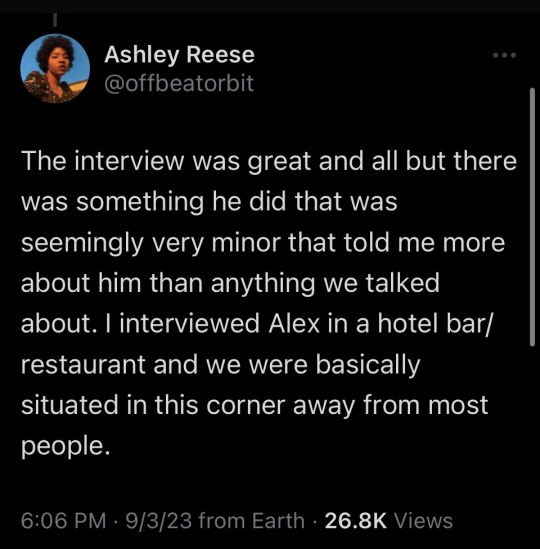
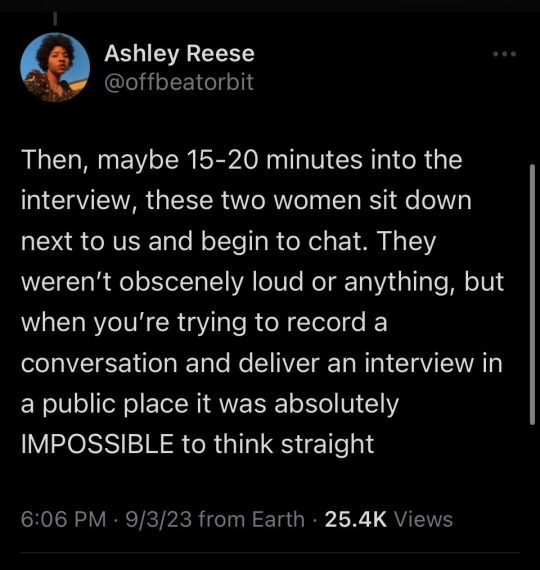
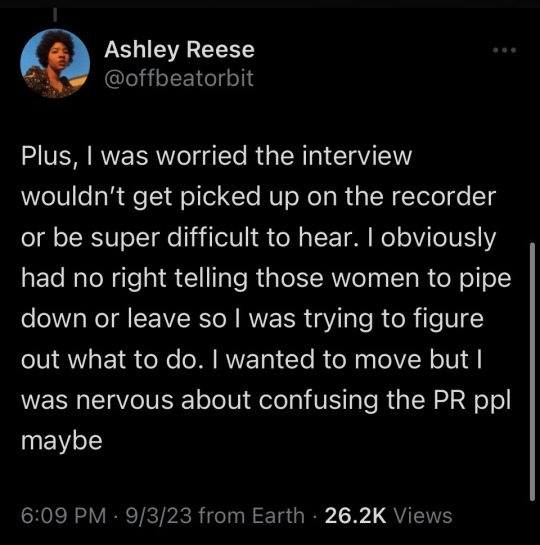


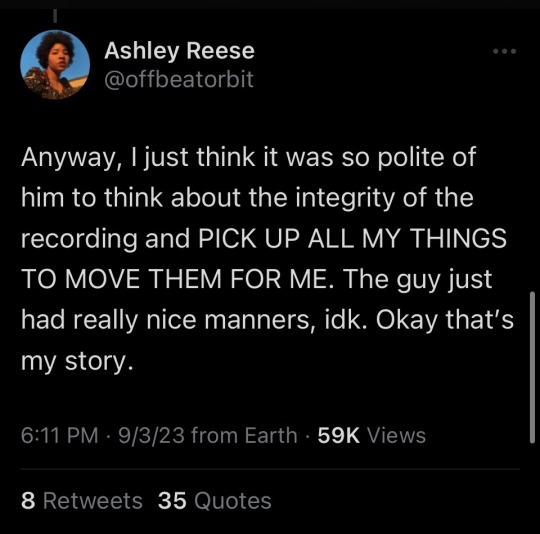
tweet thread about Alex being polite and thoughtful during an interview (😭)
#arctic monkeys#alex turner#I remember this article lol i shaded the writer for talking way too much about social media#but seeing she’s a ‘twitter famous’ person… i see why now#the story is still cute though! 😄
469 notes
·
View notes
Text
Back with a new article! Woo! Here is a list of 100 date ideas for writing romance. I often find myself wanting to write a romantic scene and defaulting to dinner--which is a classic but can become repetitive. Here are interesting prompts to inspire a variety of scenes for the sparks to fly.
Check it out and leave some claps on the article too! They help me out.
#writers on tumblr#writing tips#writing romance#writing prompts#romance prompts#article#I forgot I had a medium article to post about lol
699 notes
·
View notes
Text
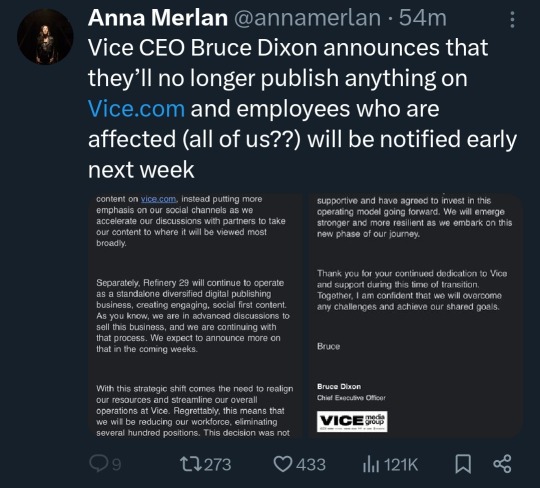
Well this absolutely sucks.
#vice is responsible for some of the funniest articles ive ever read and also some of the best reporting on far right dingdongs#im currently watching some more news' video about the internet killing journalism that literally came out 2 weeks ago#and its obviously only gonna get worse. unfortunately i reckon rolling stone might be the next to go. some of my fave writers went there#after other sites died but the EOC stepping down a few weeks ago doesnt bode well#anyway everyone go subscribe to the worker owned sites like defector discourse blog and 404 media!#because they're needed more than ever!#vice#vice news
165 notes
·
View notes
Photo
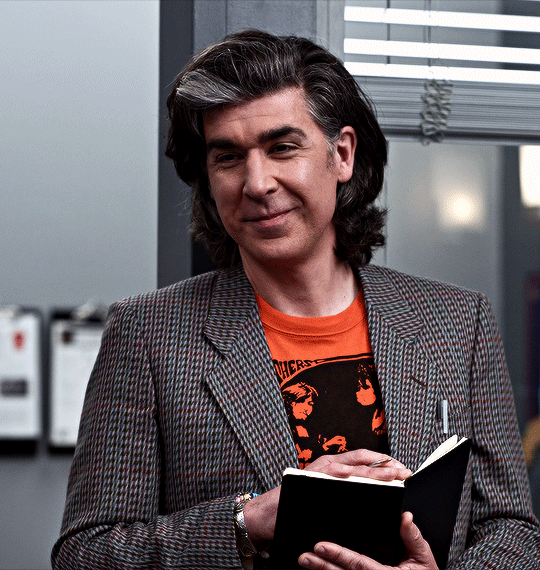
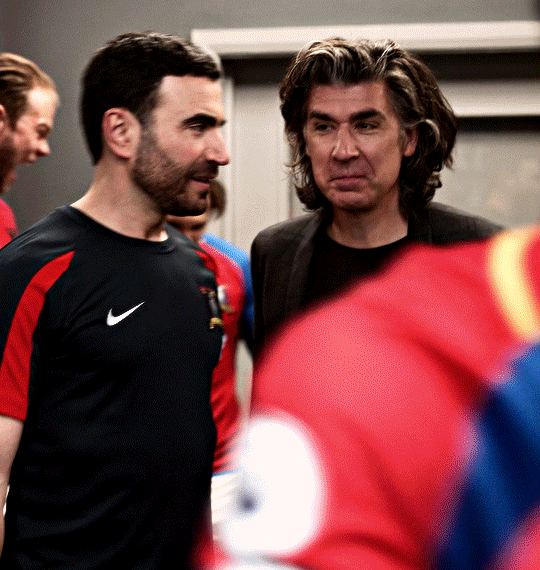

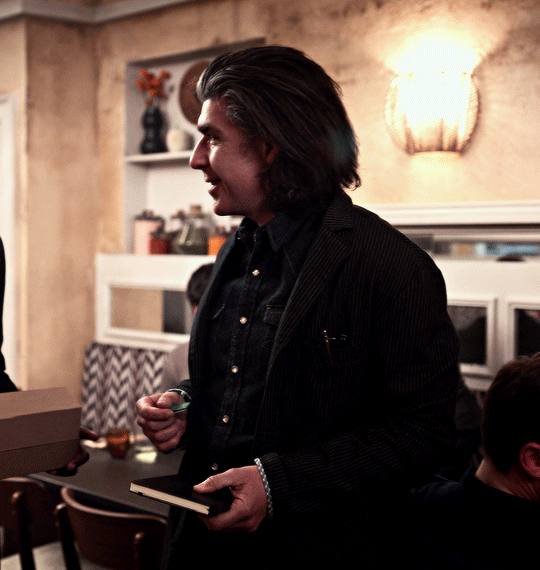





James Lance as Trent Crimm
TED LASSO | 3.03
#trent crimm#tedlassoedit#tedlassogif#chewieblog#usersugar#usergiu#userchelsea#usersnat#usersjoy#useraurore#tuserrex#userpayton#userlolo#tuserliliana#userpayel#tuserabbie#*#prayer circle that the writers dont ruin his character by making him out colin 🙏#he literally let ted know about the panic attack article trent wouldnt out colin 😭#ted lasso spoilers
1K notes
·
View notes
Text
fanfictions that have a bibliography >>>>>
#i love you endnotes that describe the writers research process#i love you writers who read scientific articles and historical newspapers
286 notes
·
View notes